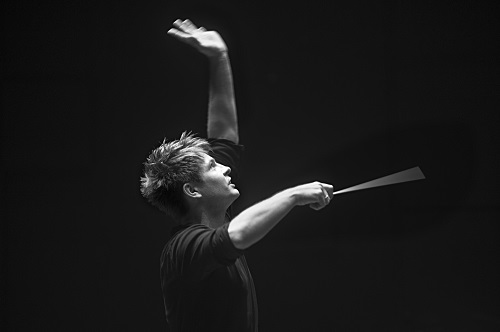 Switzerland Mozart, Penderecki, Shostakovich: Bartlomiej Niziol (violin), Lev Sivkov (cello), Philharmonia Zurich / Krzysztof Urbański (conductor). Zurich Opera House, 26.9.2021. (JR)
Switzerland Mozart, Penderecki, Shostakovich: Bartlomiej Niziol (violin), Lev Sivkov (cello), Philharmonia Zurich / Krzysztof Urbański (conductor). Zurich Opera House, 26.9.2021. (JR)

Mozart – Die Zauberflöte, Overture
Penderecki – Concerto doppio for violin, cello and orchestra
Shostakovich– Symphony No.10 in E Minor Op.93
The concert season at the opera house in Zurich opened with a spectacular concert under the baton of quirky, gifted Polish conductor Krzysztof Urbański. Last year Urbański entered the tenth season of his tenure as Music Director of the Indianapolis Symphony Orchestra and, since 2015, has been Principal Guest Conductor of the NDR Elbphilharmonie Orchestra in Hamburg.
The concert opened traditionally: the overture to The Magic Flute. It bobbed along with plenty of fizz but was really no more than a run through. Rehearsal time had clearly needed to be expended for the two difficult works followed.
Penderecki’s Concerto doppio was originally composed for violin and viola, the two instruments Penderecki himself studied and played. A Finnish cellist, Arto Noras, a regular collaborator with the composer, transcribed the viola part for cello and it was this version we heard in this concert (there is even, incidentally, an approved version for accordion!). The one-movement piece starts with an eerie, melancholy cadenza on both solo instruments and works up to an animated climax. Second solo cadenzas at the centre of the work introduce a faster passage. Towards the end of the work, the soloists and orchestra fade away in the highest tessitura. This was not a work of raw, harsh and discordant tones, as one might have anticipated from this composer, but more traditional and generally appealing fare. It was reasonably easy on the ear, and the soloists – Polish violinist Bartlomeij Niziol and Russian cellist Lev Sivkov, both highly accomplished principals from the opera orchestra – worked extremely hard to impress, and succeeded. Their technique and virtuosity could not be faulted and they received a deservedly rousing reception, from both the audience and – not unnaturally – the orchestra.
Five years ago, Krzysztof Urbański conducted a performance of the Shostakovich Tenth symphony with the Tonhalle Orchestra and I can do no better than refer you to my review for my impressions then (review click here). He is a conductor I really like to watch, even if many gestures are exaggerated and he can drive the music to extremes; the orchestra responded to him in every way. Impressively, after huge efforts in the Penderecki concerto, Bartlomeij Niziol returned to lead the orchestra. Urbański needed no score; he knows this work like the back of his hand. He does not conduct in traditional style; rather, he paints sound pictures with his hands. His left hand flutters, he contorts himself to express the anger in the score, and his feet dance along to the rhythms of the work. The slow passages were luscious and precise, the faster ones simply thrilling: the end of the militarist second movement nearly blew the roof off the opera house. There were some lip faults in the brass, some lapses in ensemble; but this was an orchestra not used to such a behemoth of a piece and needing a large number of extra strings. Two principals stood out: Bernhard Heinrichs on oboe and Nina Sara Höhn on clarinet.
The opera house is not the ideal venue for such a loud work; the Tonhalle would have been better suited. Fabio Luisi has done sterling work improving the quality of the orchestral sound, and introducing the orchestra to new repertoire, and he insisted they should play in the opera house (rather than in the Tonhalle) to maintain their identity. One cannot argue with that. It was a full house, and a splendid opening concert.
John Rhodes